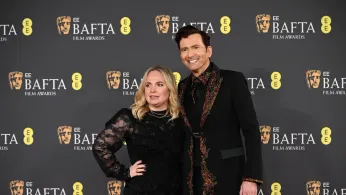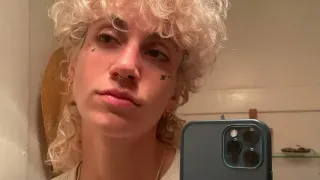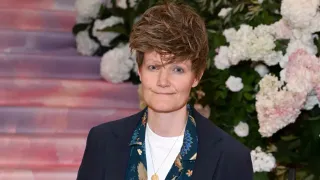
6 hours ago
Facebook Declines to Remove Death Threats Against Georgia Tennant, Prominent Trans Ally and Wife of ‘Doctor Who’ Star David Tennant
READ TIME: 4 MIN.
Georgia Tennant, well-known actress, producer, and vocal supporter of transgender rights, found herself at the center of a social media controversy after a harrowing death threat targeting her circulated on Facebook. The threat, which explicitly promised a reward to anyone who would “kill Georgia Tennant immediately,” was reported to Facebook by Tennant and her supporters, only for the platform to respond that the post did not violate its community standards, according to screenshots shared by Tennant on Instagram .
The threat—which remains documented in multiple reputable publications—has spurred widespread concern across entertainment and queer advocacy circles, with many questioning Facebook’s commitment to safeguarding users from violent rhetoric, particularly those advocating for marginalized communities.
The chilling threat was first brought to Georgia Tennant’s attention by a friend, who sent her a screenshot of the Facebook post. Tennant, recognized for her performances on screen and her activism off-screen, posted the screenshot to her Instagram account, tagging Facebook’s CEO Mark Zuckerberg and raising a pointed question: “Out of curiosity @facebook what would constitute a breach of community standards?” .
In the post’s second slide, Tennant shared Facebook’s official response, which stated, “We use a combination of technology and human reviewers to process reports and identify content that goes against our Community Standards. In this case, we did not remove the content that you reported.” This decision quickly drew anger and disbelief from followers, celebrities, and LGBTQ+ advocates. Singer Sophie Ellis-Bextor commented, “Wow I’m so sorry that’s horrendous. Police matter I’d say? Xx sending love xx,” while actress Alice Evans urged Tennant to involve law enforcement, suggesting, “They can force Meta to subpoena the details and IP address. This is outrageous and I am so so sorry.”
The Instagram post garnered tens of thousands of supportive messages in a matter of hours, with fans and allies expressing both concern for Tennant’s safety and frustration at Facebook’s apparent inaction. A significant number of commenters, including other public figures, encouraged Tennant to pursue the matter with authorities, emphasizing that such threats transcend the boundaries of internet discourse and constitute a serious criminal matter .
This incident has reignited longstanding criticism of Facebook’s moderation policies, particularly regarding hate speech and threats targeting women, public figures, and queer allies. Many queer organizations have previously highlighted the platform’s failure to consistently enforce its own standards, especially when dealing with content that incites violence against those who advocate for transgender rights .
Advocates note that Georgia Tennant’s visibility as both an entertainer and an ally to transgender people may make her a particular target for online harassment. The fact that the platform did not remove a direct call for violence—despite clear dangers—has alarmed many in the queer community. “This is about more than one post or one person,” said a spokesperson for a leading queer rights organization in the UK. “When social media companies refuse to act on explicit threats, it sends a message that hate is tolerated, and that’s especially dangerous for those who speak out for marginalized people” .
The timing of this controversy is particularly significant given ongoing debates about the responsibilities of social media platforms to protect users—especially those advocating for the queer community—from harassment and violence. Facebook’s parent company, Meta, has faced repeated calls from advocacy groups and legislators to strengthen its policies and enforcement, particularly in light of increasing hostility toward transgender people and their allies online .
Georgia Tennant’s advocacy for transgender rights has been well-documented, both in her public statements and through her support of organizations working to improve the lives of transgender people. The failure of a major social platform to remove a threat against her raises urgent questions about the safety of vocal queer allies in the public eye and the standards by which platforms adjudicate potentially harmful content .
For many in the LGBTQ+ community, the episode underscores the need for robust, transparent, and accountable content moderation—one that prioritizes the safety of those most at risk of targeted abuse. “We want social media to be a space where people can speak out for what’s right without fearing for their lives,” said a UK-based queer advocate .
In the aftermath of the incident, many have urged Facebook and other platforms to review their moderation systems and engage directly with the communities most affected by online abuse. Advocacy groups are calling for independent audits of content moderation practices, stronger accountability measures, and enhanced user protections—particularly for women, queer people, and their allies.
Georgia Tennant, for her part, has thanked her supporters and emphasized the importance of solidarity in the face of online harassment. While she has reportedly turned off comments on her Instagram post for safety reasons, she continues to use her platform to highlight the challenges faced by those advocating for equality and respect online .
Law enforcement agencies in the UK have yet to issue a public statement on the specific threat against Tennant, but several legal experts and campaigners have stressed that incitements to violence online are criminal acts under UK law and should be treated as such by both social media companies and authorities .






